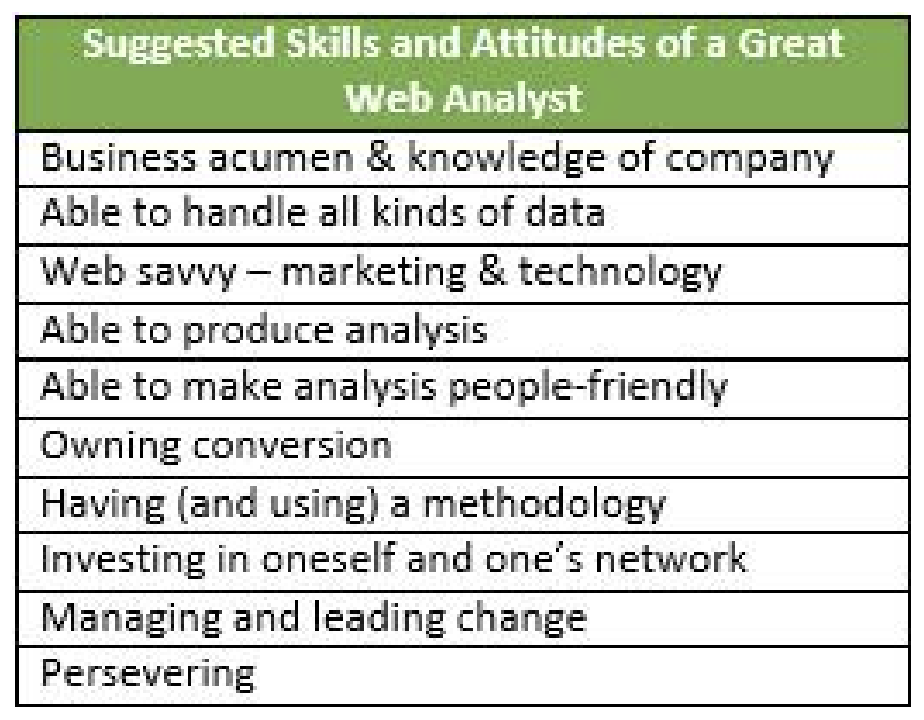After several years of hunting, the great digital analyst remains as elusive as the snipe. And it isn’t because of the lack of articles written about these elusive people. A Google search shows at least 10 such articles on this topic. Then why in the world am I writing about the attributes of a great digital analyst!!???
Because my lessons of web analytics were learned the hard way. Because there is no handbook to guide budding web analysts. And because as Avinash Kaushik validated, to find someone with the skills listed in all the articles, managers would be looking for a superman or a superwoman to fill the role of the great digital analyst!
You don’t need to find a superman or a superwoman to fill the role of a great web analyst
To tell you the truth, this article isn’t about finding that great analyst. Those readymade great (and rare) analysts are available at about $150-200K per year. Just find them on LinkedIn.
This article is about the process of maturing a newbie analyst into a great analyst. This article is for managers looking to groom that great analyst, and it is for analysts looking to become great web analysts.
How It Started
I got really lucky. I picked up my digital analyst experience in a large organization where site visitors were counted in the millions. I asked for and I worked on projects that needed deep data analysis. More importantly, the organizational environment promoted my development as an analyst. In fact, I still analyze data for our websites and for client websites periodically.
So everything I am about to say is based on real world experience.
Let’s Review Suggestions
Before I get into the details, let us revisit what others have said about the skills of a great analyst so far:

Now that you know what has been said, let’s take a different approach to understanding what makes a digital analyst great.
The Environment
Managers and Decision Makers: The transformation of a mere mortal analyst into a demi-god analyst requires the right environment and encouragement from management. Understand the growth stage of your analytics team and determine where they stand individually. Check for the one characteristic that is a must have for all great analysts. More on this characteristic later in the post. Then figure out whether you have the time and the potential on your team to generate great analysts. If not, then go get a promising analyst and groom him/her into one.
Beginner and Good Analysts Reading This Post: Your transformation into a great analyst requires external as well as internal factors to work together in harmony. The internal factors you can control. The external factors, however, you can only influence at best. So if you do not see these factors coming together, go find yourself another company where you will be appreciated and groomed. Seriously. As a great analyst, your shelf life is about three years. After that, you will be moving on to even bigger and better things. So don’t let the external environment bog you down!
The Hard Skills (Prerequisites)
This is the easy part. While it helps for an analyst to have a degree in a related discipline, what’s really important is to have a good grasp of the basic concepts of math and algebra. Ratio, time series, and percentage calculations should come easily to the analyst. Use of Excel for analysis and knowledge of analytics software such as Google Analytics to analyze data is necessary. In short, the person should have the technical qualifications to be a digital analyst. If not, and there is still desire to become a digital analyst, then they can start with the basics of web analytics.
See, this is the easy part!
The One Soft Skill (aka The Really Difficult Skill)
There is only one skill that really sets great analysts apart from the crowd. This skill can be learned from scratch, but hopefully it just needs to be activated inside.
That single skill is Metacognition
Simply put, metacognition is the ability to think about thinking. But that’s a highly simplistic definition that really doesn’t do it justice. Let me get more precise:
According to the Teal Center, “Metacognition is one’s ability to use prior knowledge to plan a strategy for approaching a learning task, take necessary steps to problem solve, reflect on and evaluate results, and modify one’s approach as needed”
Now that is a mouthful. So let’s break that down into digestible chunks.
Metacognition from a Digital Analytics Lens
I’m going to use the example of a real world problem to explain what metacognition means from a digital analytics perspective. Let’s say conversion for a website is down by 10 percent for one day. The CEO thinks there’s a problem. The boss thinks there’s a problem. The analyst thinks there might be a problem. All eyes are now on the analyst to figure out whether there is a problem.
You might think this doesn’t need metacognition. It just needs the analyst to dig into the data, segment it, and figure it out. That’s exactly what a regular analyst would do. Let’s look at what a great analyst would do!
Metacognition can be divided into three distinct process skills:
- The ability to think about a plan of action
- The ability to maintain and monitor the plan of action
- The ability to self-assess and self-adjust after
1. The Ability to Think About a Plan of Action
So the challenge is that conversion has dropped and there might be a problem. Great analysts first understand the variables in the situation, so a plan of action can be put together. Here are the questions they ask:
- “What had I done the last time conversion had dropped?” – The question isn’t what the root cause was last time. Instead, the question is to recall the process that was followed.
- “Given my last experience, do I have all the right skills, or do I need help?” – Make a conscious assessment of who needs to be involved in the analysis.
- “Do I know enough about the situation to put together a plan?” – Before diving in, understand the situation thoroughly.
- “Do I have enough time to complete the task?” – Make a clear choice of what needs to stop if you need to take this project on.
- “What should my first step be?” – Make a very methodical decision about the first step.
2. The Ability to Maintain and Monitor the Plan of Action
Once the plan of action has been determined, then great digital analysts assess how well they are progressing with their investigation. There is no sense of panic because the approach is extremely systematic. Here are questions they ask:
- “Have I identified the major internal and external factors that could have caused the drop in conversion?” – Check if there was anything missed.
- “Am I on the right track, or should I try something else?” – Question if there is a better way to get to the answer.
- “If there is no conclusion, what information can I provide to make an informed decision? ” – Think beyond the immediate next steps.
- “What other metrics can I use to confirm whether there is a problem?”- Always get to the conclusion in a couple of different ways.
- “Am I asking the right questions?” – Never be overconfident. Even the best analysts make mistakes. Humility is a key ingredient of web analysis.
3. The Ability to Self-Assess and Self-Adjust After
The most important part of any ongoing process is the feedback loop to make improvements. Similarly, great analysts self-assess to understand what they did well and what they could have done better. This isn’t about asking others to provide behavioral feedback. Instead, it is an introspective step to better the analyst’s process that only the analyst knows well. Here are a few questions they ask themselves:
- “Did I find a more effective way to analyze the conversion drop?” – There are always multiple ways to get to the answer. Understand the pros and cons of your methods.
- “Could I have been more efficient?” – Check if there is a way to get faster through process improvements or perhaps through automation without compromising the quality of the analysis.
- “Can my approach be applied to another analysis?” – Always check for reusability of the approach. This is a critical step in building knowledge for future use.
- “Is there a process gap that could have prevented or identified the problem sooner?” – And the ultimate question of how to avoid a similar situation in the future.
- “Is there a knowledge gap that I need to address within myself?” – There is always something new to be learned. What is the next priority item? Is it a new programming language, a new technical concept, a business concept perhaps?
Now that we know what metacognition has to do with digital analytics, let’s pack the skills of a great analyst into 10 words:
A great digital analyst is technically competent and highly metacognitive
What Managers Can Do
As a manager, you need to encourage thinking. A busy analyst is not a metacognitive analyst. Get your analysts to think about the analytics process rather than doing busy work such as generating reports.
Guide the development of your analysts through the five distinct stages of maturity of an analyst (a future post on that topic). An organization can be a highly political place. Understand the situations that your analysts could grow and get them to flex their abilities in these areas.
Don’t lament that you don’t have great analysts. You can groom your existing team into a team of superstars.
What Analysts Can Do
The brunt of your growth into a metacognitive superstar is on you. Every analyst has a certain amount of metacognition. To turn great, put it into hyper drive. Make it a rule to practice the three phases of metacognition every day. It will gradually turn into a habit.
If you really want to kick ass, then volunteer for a falsification exercise each week. You won’t make a whole lot of friends, but it will sharpen your thinking process like nothing else can.
Finally, spend more time thinking and less time doing. I know it sounds counterproductive, but it works.
TL;DR
Great analysts don’t just pop out of the earth. They need to be groomed for success. After technical qualifications, the single most important skill a great analyst possesses is metacognition. The average analyst has a certain level of primitive metacognition. To become great at analytics, that metacognitive ability needs to be significantly amplified.
What have your observations been about great digital analysts? Let us know in the comments and on Twitter @BayLeafDigital.



